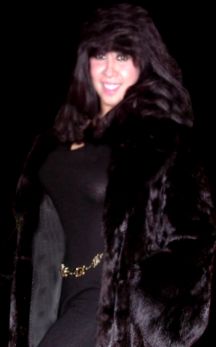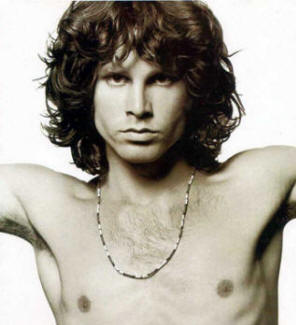As the lead
singer and lyricist for
the Doors,
Jim Morrison
is one of the most legendary and influential
figures in
rock & roll history. The disturbing, image-rich
poeticism of
Morrison's
lyrics, perfectly supported by
the Doors'
swirling, eclectic psychedelic rock, have assured
him continuing icon status, while his fondness for
theatrical shock tactics and nihilistic angst have
influenced countless imitators. Unlike other
psychedelic artists, who tended to favor whimsy or
mysticism,
Morrison
saw expansion of consciousness as a way of gaining
access to the subconscious mind's dark,
unacknowledged desires; his rampaging id dominated
his songs with a lust for violence, sex, alcohol,
drugs, self-destruction, anything forbidden for any
reason by the authority of conservative middle
America, and he tried to live out that lifestyle as
best he could. Some of
Morrison's
work has been criticized -- both during his lifetime
and afterward -- as too melodramatic and
calculatedly outrageous, but even at his most
frustrating,
Morrison's
ideas have achieved a lasting resonance with newer
generations as well as his initial fans, and his
best material remains some of the most original and
visionary rock music ever recorded.
James Douglas Morrison
was born on December 8, 1943, in Melbourne, FL. His
father was a rear admiral in the U.S. Navy, and the
family thus moved around a great deal. A strict
authoritarian,
Morrison's
father was probably a major source of the outlandish
rebellion that his son later acted out on-stage;
when
Morrison
began his climb to stardom, he would falsely claim
that both of his parents were dead. After attending
St. Petersburg Junior College and Florida State
University for a year apiece,
Morrison
moved to the West Coast to study film and theater at
UCLA in 1964. He became infatuated with the poetry
of William Blake and the writings of philosopher
Friedrich Nietzsche, and he gradually drifted away
from school to work on his poetry and experiment
with drugs, particularly LSD. In 1965,
Morrison
so greatly impressed film-school classmate
Ray Manzarek
(a classically trained keyboardist and member of a
local blues band) with his early attempts at lyric
writing that the two decided to form a band.
Robbie Krieger
and
John Densmore
were soon recruited from the Psychedelic Rangers,
and
the Doors
were born; the name was
Morrison's
idea, taken from The Doors of Perception, Aldous
Huxley's book on mescaline, and its introductory
William Blake quote.
Morrison
was a tentative frontman at first, avoiding eye
contact with the audience and sometimes even singing
with his back to them, but he soon came out of his
shell, flinging his mike stand around and using it
as a phallic symbol. As
the Doors
rose to stardom with their 1967 debut and struggled
to maintain that status,
Morrison's
ever-increasing withdrawal and simultaneous
indulgence in hedonistic excess threatened the
band's stability. He destroyed some of the band's
studio equipment in a drunken outburst of temper,
and he designed his ever more erratic concert
behavior -- miming sex, barrages of profanity, and
similar antics -- to provoke intense, frenzied
audience reactions. This did not go unnoticed by law
enforcement officials in the locales where
Morrison
performed; he was maced by police in New Haven, CT,
who caught him backstage with a female fan, and
after taking the stage and baiting the officers, he
was arrested on obscenity charges, of which he was
later acquitted. Venues in Phoenix and Long Island
subsequently banned
the Doors
after
Morrison
allegedly incited audience riots; the whole mess
finally boiled over in March 1969, when
Morrison
exposed himself to an audience in Miami and was
arrested for displaying "lewd and lascivious
behavior." After a two-month trial, he was found
guilty, depleting the band financially and mentally
and nearly causing their breakup.
The Doors
retreated to the studio, where they sounded
musically rejuvenated on the hard-rocking Morrison
Hotel (1970) and L.A. Woman (1971). Supporting tours
were marked by continued police harassment, and
afterward, a depressed
Morrison
left the country with his wife Pamela, eventually
settling in Paris to unwind and write poetry (he had
had his first collection of poems, The Lord and the
Creatures, published in 1970). But without the
support of his bandmates,
Morrison
spiraled irrevocably out of control, and he was
found dead in his bathtub on July 3, 1971, the
victim of an apparent heart attack. He was only 27
years old.
Morrison
was buried in the Poets' Corner of Pere Lachaise
Cemetery in Paris, an area shared by Balzac,
Moliere, and Oscar Wilde. Live recordings,
greatest-hits collections, and recordings and books
of
Morrison's
poetry have appeared frequently in the years since,
and his legend has only grown with the passing of
time. ~ Steve Huey, All Music Guide


